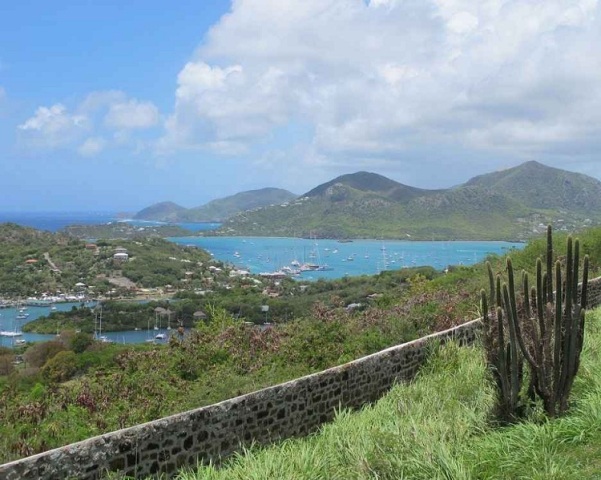Read on to learn some facts about Antigua and Barbuda, an incredibly unusual chunk of land, ringed with beaches defined by the finest white sand and other interesting features.
Facts About Antigua & Barbuda
Antigua and Barbuda are twin islands located between the Caribbean Sea and the Atlantic Ocean. These twin islands consist of a number of small islands. The island is separated lies in the middle of the Leeward Islands, a part of the Lesser Antilles. These twin islands were first inhabited by archaic age hunter-gatherer Amerindians, erroneously referred to as Siboney or Ciboney. The political framework of Antigua and Barbuda consists of a federal, parliamentary, representative democratic monarchy, in which the monarch is the head of the state appointing the governor general. Elizabeth II is the present Queen of Antigua and Barbuda. The main contributors to the economic growth of Antigua and Barbuda have been construction, banking and insurance, communications, and wholesale and retail trade sectors driven by a construction boom in hotels and housing. Antigua and Barbuda's currency is the Eastern Caribbean Dollar, a regional currency shared among members of the Eastern Caribbean Currency Union. Go through the article to learn some interesting and fun facts about the twin island nations.

Image: Patrick Hawks@flickr
Interesting And Fun Facts About Antigua & Barbuda
-
Antigua and Barbuda gained full independence in the year 1981.
-
Vere Cornwall Bird was a famous leader who was behind the labour movement in Antigua and Barbuda in the 1940s. Bird became the first Prime Minister of Antigua and Barbuda.
-
Despite their small population, Antigua has given some of the best cricketers to the world including Sir Vivian Richards, Richie Richardson, Andy Roberts and Curtly Ambrose.
-
The words ‘hammock’, ‘hurricane’, ‘tobacco’, ‘barbecue’ and ‘canoe’ all are derived from the Taino language, spoken by people in the Caribbeans, of which Antigua and Barbuda are also a part.
-
Antigua and Barbuda are best visited during the cool and dry winter months (mid-December to mid-April), the peak tourist season. In January and February, the coolest months, the average daily high temperature is 81°F (27°C)
-
The Carnival is Antigua’s big annual festival which is held from the end of July and culminates in a parade on the first Tuesday in the month of August. Most of the activities take place in St John's.
-
Make sure to carry a mosquito repellent as well as a big supply of sunscreen even if you want to get a tan. Sunburn is very common on the beaches of Antigua and Barbuda. The mosquito repellent is for the tiny sand flies.
-
Be careful of the tiny black sea urchins on the beach, as they tend to hide in sea grass. The spines of these creatures can prick you and at times can even enter your skin.
-
There is a 24 hrs causalty service provided by all the hotels that have their own doctors on call.
-
Do not attempt to eat any of the little green apples, fruit of the ‘manchineel’ tree, because they are poisonous. Make sure not to take shelter under these trees as they give out poisonous sap which can cause blisters on your skin.
-
Boggy peak is the highest point of Antigua and Barbuda on the island of Antigua. It is 402 m high.
-
Americans from the American mainland were the early settlers on the island.
-
The early European colonies of Antigua and Barbuda were from Spain, France and England.
-
Christopher Columbus while serving Spain visited the island in 1493.
-
Antigua and Barbuda became a British Colony in 1667.
-
It was in the 1680s that Christopher Codrington started large scale plantations in Antigua.
-
There were many slaves brought to the island during colonial rule to work on the sugar and tobacco plantations.
-
The uninhabited island of Redonda was an important source of phosphates for Antigua and Barbuda. Removal of phosphates took place between 1869 and the beginning of the First World War.
-
The island was administered as part of the Leeward Island Federation between 1871 and 1956.
-
Antigua and Barbuda were members of the Federation of the West Indies between 1958 and 1962.
-
Antigua and Barbuda, along with a small island of Redonda, became a self-governing state within the British Commonwealth, in 1967.
-
The British monarch is the Head of State of Antigua and Barbuda and is represented by a Governor General.
-
Antigua and Barbuda were one of the Caribbean islands to give support to the US invasion of Grenada in 1983.
See also
More from iloveindia.com
- Home Remedies | Ayurveda | Vastu | Yoga | Feng Shui | Tattoos | Fitness | Garden | Nutrition | Parenting | Bikes | Cars | Baby Care | Indian Weddings | Festivals | Party ideas | Horoscope 2015 | Pets | Finance | Figures of Speech | Hotels in India : Delhi | Hyderabad | Chennai | Mumbai | Kolkata | Bangalore | Ahmedabad | Jaipur
- Contact Us Careers Disclaimer Privacy Policy Advertise With Us Lifestyle Sitemap Copyright iloveindia.com. All Rights Reserved.







